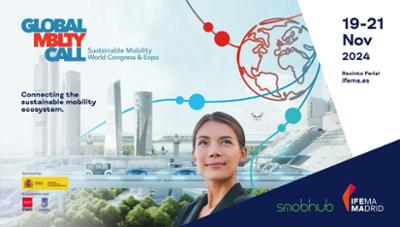

International experts and leaders to address the major challenges of sustainable mobility at Global Mobility Call 2024

The third edition of this major international event will feature 7 thematic itineraries that will structure the Agenda of the GMC Congress Space, where the most relevant challenges and aspects of sustainable mobility will be addressed from 19 to 21 November.
The third edition of Global Mobility Call, the leading international event for the sustainable mobility ecosystem, organised by IFEMA MADRID and Smobhub, will take place in Madrid from 19 to 21 November 2024. It will include an exhibition area -GMC Expo- with the latest innovations and advances in the field of mobility, as well as a congress area -GMC Congress- with the most relevant content agenda of the moment. The latter will address the current and future challenges and solutions for a cleaner, safer, connected and equitable mobility through 7 thematic itineraries in which new solutions will be addressed in response to the social and economic challenges related to sustainable mobility.
Once again this year, this international Congress-Expo is sponsored by the Ministry of Transport and Sustainable Mobility, with the collaboration of the Community of Madrid and Madrid City Council, the participation of the main players in the national and international mobility ecosystem, companies, public administrations, international institutions and organisations, sectoral associations and employers' associations, as well as the innovation sector (start-ups, technology centres and universities).
Thematic itineraries of the conference
The thematic areas that will structure the major content agenda on sustainable mobility will be: 1.- Energy transition driving the transformation of mobility; 2.- Intermodal transport: a more efficient and sustainable vision of mobility; 3.- Public transport and shared mobility at the heart of urban mobility solutions; 4.- Smart mobility planning for more inhabitable cities and areas; 5.- The mobility revolution and its progress. Technological trends driving change; 6.- The transition of the automotive industry in a future scenario of high uncertainty; and 7.- Innovation for disruptive mobility.
These themes will bring together more than 400 international leaders, CEOs, experts and academic professionals, who will address the challenges, solutions, experiences and provide their vision of the future to respond to the needs posed by the transformation of mobility from different economic, technological, regulatory, social and environmental outlooks.
The first theme will focus on how the energy transition is driving the transformation of mobility, including discussion on the energy mix, electrification, the development of alternative clean fuels, the acceleration of infrastructure and the future development of batteries, as well as energy storage and power. In intermodal transport, the focus will be put on the integration of different modes of land, rail, sea and air transport to improve efficiency and the development of multimodal logistics hubs for the transport of goods and the promotion of sustainable economic development. The itinerary on public transport and shared mobility, which will focus on the relevance of public transport as the main feature and integrating element of mobility in cities and territories, as well as multi-modality and MaaS solutions as key elements of the offer of flexible mobility to citizens. In particular, the chapter on active mobility will be developed: cycling and walking.
The smart mobility planning track will bring together experts in urban management who will discuss how the integration of new technologies and the development of shared platforms and data centres for better planning, management and governance of traffic and services in cities. As well as last mile delivery or the emerging need to establish the new urban airspace. The development and revolution of mobility, with the technological trends driving the change will give us the vision on the revolution that technological advances are bringing to the transformation of mobility, such as 5G, drones, hyperloop, connectivity or smart digital solutions and how Artificial intelligence will contribute to the development of mobility.
The transition of the automotive industry will address the future supply mix, the integration of infrastructures, the new business model and the new value chain of the sector as a whole. Alongside innovation for disruptive mobility, which will involve the main actors such as Technology Centres, Universities, the start-up ecosystem and the main European cross-cutting projects to give us a vision of the relevance of innovation in the future of mobility solutions. It will devote a special chapter to cybersecurity, a cross-cutting and highly relevant issue.
Global Mobility Call will also have a GMC Expo space. It will boost the ability of companies to showcase their latest developments and encourage networking to generate new business opportunities.





